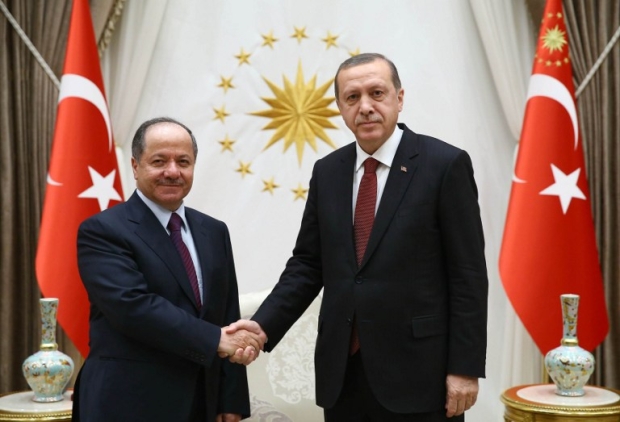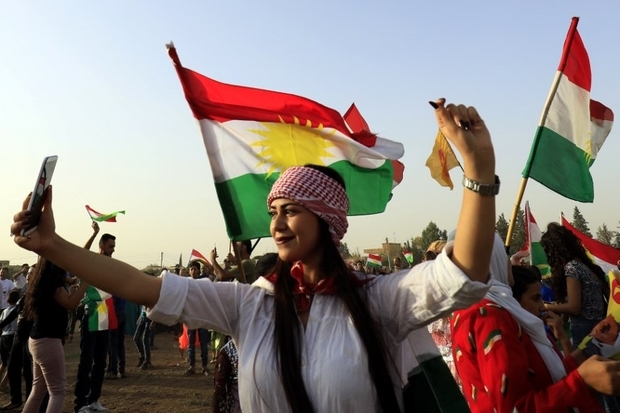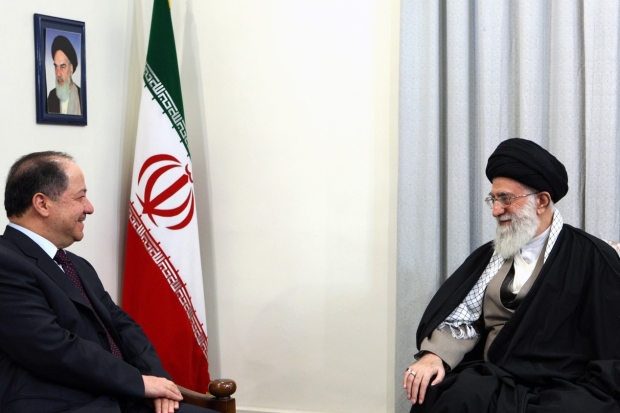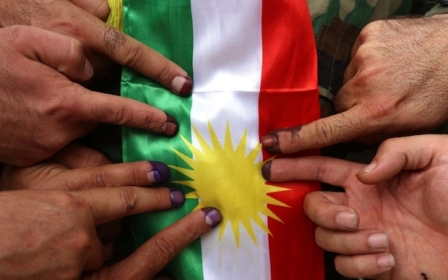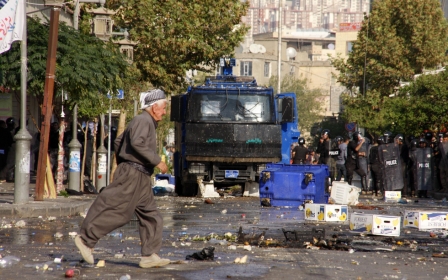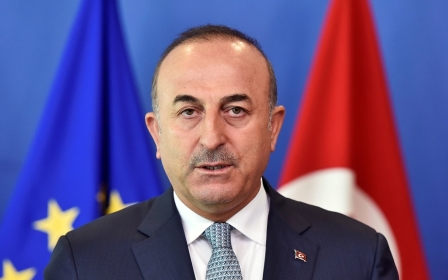
The limits of transactionalism in Turkey-Kurdistan relations
Turkey's relationship with Iraqi Kurdistan has been a subject of much controversy. Though there have been many factors that have shaped it, its nature has arguably remained the same: transactional.
Turkey's stance on the Kurdish independence referendum, held last September, has clearly illustrated the nature of the relationship. Turkey's position, however, was motivated by multiple factors.
The first one is Turkey's default position, which is to support the territorial integrity of countries to its east and southeast. The fact that Kurds almost uninterruptedly populate the belt lying along Turkey's southern and southeastern borders has been one of the main motivations for Turkey to uphold the principle of territorial integrity of its neighbourhood so tenaciously.
Turkey has either kept silent or offered low-key criticism of the Iraqi Kurds' territorial expansion
For instance, while any irredentist reclaims by its Middle Eastern neighbours send alarm bells ringing in Ankara, the same does not apply to its western border. For example, the breakup of Yugoslavia or the emergence of countries such as Kosovo hasn't caused much concern. To the contrary, Turkey welcomed the new states.
In fact, when Kosovo's provisional government unilaterally declared independence from Serbia without even holding a referendum, Turkey was among the first group of states in extending recognition to this new state.
The major difference in Turkey's lax approach to state break-up along its western borders and its alarm when it happens along its southeastern borders is due to Turkey's ever-present Kurdish question.
The 'golden era'
But for a while Turkey's default position, particularly towards the Iraqi Kurds, appeared to be changing. The thaw in the relations between Turkey and the Kurdish Regional Government (KRG) occurred around 2008.
Besides issues of common concern such as the de-securitisation of the Middle East and the Kurdish question, burgeoning economic and trade ties between Turkey and the KRG were major contributors to a positive turn in relations.
In fact, by 2009–10 Iraq featured among Turkey's top three trading partners. This received a further boost when Turkey also sought to resolve its own domestic Kurdish issue through peaceful and political means.
Despite some interruptions, this policy continued from 2009 to 2015. The sectarianisation of regional politics, the growing power of Shia parties in Iraq as well as Iran's increasing influence in Baghdad further cemented relations.
During that period, personal bonds between Turkish President Recep Tayyip Erdogan and KRG President Massoud Barzani appeared to be solid. The level of economic, energy, and political interdependency between Turkey and Iraqi Kurds reached a significant peak. Needless to say, that this was an asymmetric interdependency in which Iraqi Kurdistan's level of dependency on Turkey was greater than the other way around.
In fact, this interdependency provoked concern in regional capitals such as Baghdad and Tehran as well as in Washington. Turkey has been the Iraqi Kurds' gateway to the rest of the world. Despite the central Iraqi government's opposition, Kurdish oil flows to international markets through Turkey.
During times of economic difficulty, Turkey has also provided much-needed economic support to Iraqi Kurdistan.
Such developments triggered questions as to whether Turkey had changed its position on the Kurdish aspiration for statehood in Iraq. Turkey played a crucial role in helping the KRG lay the foundations for its economic independence from Baghdad.
A change of discourse
When former Iraqi prime minister Nouri al-Maliki cut Iraqi Kurds' share - 17 percent - of the national budget, the KRG tried to make up for this loss by independently selling its oil onto the international market, a move facilitated by Turkey and which has been seen as a major step towards economic sovereignty.
Likewise, during the fight against Islamic State (IS), Iraqi Kurds effectively acquired most of the territories that were designated as disputed between the central government and Erbil, and which were supposed to be resolved according to Articles 140 and 119 of the Iraqi constitution by no later than 31 December 2007.
The more territory IS has lost, the more Kurds have recovered what they consider to be part of a projected Kurdistan. The KRG has expanded its territory by more than 40 percent as a result of the fight against IS.
Why didn't Turkey try to explore another option that could still prevent the Kurdish independence while not playing into the hands of the central government and Iran?
Turkey has either kept silent or offered low-key criticism of the Iraqi Kurds' territorial expansion. On top of this, Turkish officials - starting with Erdogan - changed their discourse over Kurdish ambitions for statehood, which they framed as an internal Iraqi affair only two years ago.
Many, including the Iraqi Kurdish leadership, interpreted this as Turkey's tacit acquiescence over Kurdish independence.
A stress test of relationships
Yet these expectations proved to be ill-conceived, as Turkey has gradually ratcheted up its opposition towards the Iraqi Kurdish independence which took place on 25 September. To scuttle this move, it has pursued, though very belatedly, a policy of active diplomacy.
Turkey's foreign minister and chief of intelligence visited Iraqi Kurdish leaders to dissuade them from proceeding ahead with the referendum move. Additionally, it engaged with Iran and the central Iraqi government.
When such visits failed to bring about the desired outcome, President Erdogan broke his silence on the issue and adopted an increasingly acrimonious language on the subject.
However, similar to the US's diplomacy, Turkey's diplomacy was dead on arrival for two reasons. First, it came too late. Barzani has been voicing his intention of holding an independence referendum for more than a year, and the KRG set a date for the independence referendum on 7 June.
Turkey embarked on an active diplomacy to dissuade the Kurds from holding the referendum only weeks before the set date.
At this stage, it was no longer palatable for the Iraqi Kurdish leadership, and particularly Barzani, to accept this demand for domestic political consideration. If accepted without any meaningful concessions from the central Iraqi government (which wasn’t forthcoming), this would have significantly weakened Barzani domestically.
Nevertheless, the fact that Barzani had to step down- immediately after the referendum move backfired- clearly shows that he has miscalculated his options as well.
Second, Turkey's plea for a postponement of the referendum was not accompanied by a viable alternative offer either. Though Turkey voiced its readiness to mediate between Erbil and Baghdad on legitimate Kurdish demands, it didn't put forward any viable and concrete proposal to settle the dispute.
Moreover, the prospect of Turkey offering anything concrete to alleviate the Kurdish grievances vis-a-vis Baghdad was already very limited, for the simple reason that Turkey had little leverage, if any, over the central government, which made it unlikely for Turkey to be able to play the role of a strong mediator between the two sides.
However, the question posted by many observers was the following: Given the nature of relationships between Ankara and Erbil in recent years, why has Turkey been so opposed to the Kurdish independence referendum and the prospect of Kurdish statehood?
Or why didn’t Turkey try to explore another option that could still prevent Kurdish independence (which was not anyway in offing for the near future) while not playing into the hands of the central government and Iran?
Turkey’s concerns over Kurdish statehood
First, with the breakdown of the Kurdish peace process and the subsequent urban warfare that took place in 2015 to 16, the Turkish government began once again addressing the Kurdish issue, and the Middle East region as a whole, from a security perspective.
The AK Party government has done its utmost to change perceptions of the Middle East in Turkey. For a long time, the Middle East was largely regarded in Turkey only through the prism of a security threat. It was seen as the geography of Kurdish separatism, Islamic radicalism and backwardness.
Upon coming to power, the AK Party has gradually deconstructed such perceptions of the Middle East through economic engagement. Domestically, this has been accompanied by a new approach to the Kurdish question and Kurds in general, adopting a more political and civilian approach rather than a security one to the Kurdish issue.
Recently, we have witnessed the reversal of this politics of desecuritisation, both towards the Middle East and the Kurdish question. The breakdown of state authority, the rise of extremist groups, the PKK–PYD's gains in Syria and Iraq, and the pressure this has put on Turkey's border and internal security culminated in a change of approach to the Middle East.
Moreover, the AK Party's alliance with the nationalist MHP (Nationalist Movement Party) and its leader Devlet Bahceli in the run-up to Turkey's constitutional referendum on an executive presidency seems to have had a significant impact on Turkey's foreign and domestic policy.
Erdogan and the AK Party are determined to hold onto this alliance in the run-up to Turkey's three fateful elections in 2019. The implication of this - accompanied by the new type of statism that is prevailing in Ankara - would be a regressive "Bahceli effect" on Turkey's domestic and foreign policy.
Centrality of Kurdish issue
Given the centrality of the Kurdish issue to the political identity of the MHP, it is plausible to argue that in no policy area will the impact of this alliance be felt more strongly than on the Kurdish issue and the government’s approach to Kurds across the region.
For this domestic policy consideration, Erdogan would have preferred not to be forced to have a stance on the Kurdish independence debate. In other words, Erdogan's first choice would have been not to be forced to make a choice - his hope and calculations were probably pinned on the assumption that the referendum would be postponed.
Because any decision, with or against, could carry political cost for him, particularly in the run-up to the 2019 elections. The coalition that made it possible for the constitutional referendum, which changed Turkey's parliamentary-centric political system to that of the executive presidency, was also a factor that put him in a difficult position and curbed him from taking a clear stance on the referendum.
Both the additional Kurdish and nationalist Turkish voters were crucial for the passage of the referendum with only 51.4 percent of the votes. Erdogan wants to preserve these voting blocs as country heads for the 2019 elections.
He can ill afford to lose any component of this bloc. In this respect, his strong rejection of the referendum would have alienated the Kurdish voters (particularly the conservative and Islamist Kurds who generally vote for the conservative-Islamic party - currently the AK Party), whereas his silence would have had the same impact on the Turkish nationalist voters.
When Barzani decided to go forward with the referendum, he had to take a clear stance, a result of which was that he was ready to sacrifice some part of his conservative Kurdish electoral base.
Regionally, as the referendum date was approaching, the positions of regional and international actors were becoming clearer. At the regional level, Iran has emerged as the most vocal opponent of the independence referendum, whereas Israel has become the only vocal proponent of Kurdish independence.
Turkey has allied itself with Iran and the central Iraqi government on this issue.
Moreover, while some regional actors spoke out about the referendum, others remained silent. Gulf countries have mostly kept a relative silence on this issue. Saudi Arabia's minister of Arab Gulf affairs Thamer al-Sabhan visited Barzani and offered mediation between Erbil and Baghdad.
The United Arab Emirates also remained silent on the issue. This regional picture sheds light on post-'Arab Spring' regional issues and realignments. The fact that Israel is publicly supporting the Kurdish independence and Gulf Arab states aren't opposing it, seems to further strengthen the Iranian and Turkish opposition to the independence referendum, given the acrimonious nature of relations between them.
To be more precise, whereas it was Turkey's identity crisis that was largely at play on the Kurdish independence referendum, the fact remains that Turkey hasn’t still crafted a notion of an identity which can accommodate Kurdishness; for Iran, it was the regime's insecurity that was the primary factor behind its strong opposition.
In other words, from an Iranian perspective, the geopolitical identity of a would-be Kurdistan was regarded as a threat - a Western, US, Israel-friendly, Turkey, and Gulf-friendly country on Iran's borders.
Shared concerns
This issue also reflects the regional divide that has become more evident with the anti-Qatar blockade. In fact, the recent thaw in Turkish–Iranian relations has been facilitated not by shared interests but rather by shared concerns. On top of the list of shared concerns is the Kurds' rise. The same logic applies to Turkish–Iranian pro-Qatari positions over the Gulf crisis. Both counties were concerned about the intentions of the Arab Gulf coalition.
The above mentioned factors have formed the background of a forceful Turkish reaction to the Iraqi Kurdish independence referendum. In addition to a powerful discourse, Turkey, prior to the referendum, tried to express its dissatisfaction in several ways beforehand.
The Turkish Armed Forces launched military exercises on 18 September outside the town of Silopi, which sits less than 10 kilometres from the intersection of Turkey’s borders with Syria and Iraq. Turkey’s leadership also sent signals that diplomatic, economic and security options would be implemented if the referendum was not cancelled.
Turkey has even agreed with Iran and Iraq to consider taking coordinated counter-measures against the KRG's bid to hold the independence referendum at a trilateral foreign ministers' meeting in New York.
However, none of these warnings have dissuaded the Iraqi Kurds from holding the referendum, which received around 93 percent of public support for independence, where the turnout rate stood at 72 percent.
In the aftermath of the referendum, despite Turkey's strong rhetoric, it didn't undertake many consequential concrete measures. In fact, it isn't what Turkey did, rather what Turkey didn’t do that counted more during this crisis.
To be more precise, Turkey, by not opposing to Iraq-Iran's plans in the aftermath of the referendum, proved to be fateful. At this stage, it appears that most of what Turkey has demanded for normalisation of the relations with the KRG after the referendum has happened. Baghdad took control over disputed territories including Kirkuk.
The KRG accepted Iraqi federal court's verdict of annulling the referendum. Probably, Baghdad will soon also co-administer the KRG's border crossings and airports. On top of this, the architect of the referendum, Barzani, stepped down from his position as president of the Kurdistan region.
Replacing him was his nephew Nechirvan Barzani, one of the key architects behind Turkey-Kurdistan relations. All this paving the ground for the normalisation of relations. But this normalisation will not be swift. It will be a slow and gradual process. The relations are unlikely to go where they were before the referendum. Recovery will take time.
But the speed and evolution of the relations or recovery will not be only dependent on the bilateral Turkey-KRG relations, they will also be dependent on Turkey-Iraq or Turkey-Iran relations.
If Turkey feels that it is unlikely to gain anything meaningful (be it in the form of the fighting the PKK or oil and reconstruction contracts) from central government and Iran for sacrificing the KRG and Barzani, it is then likely to reconsider its recent policy. But perhaps by then, Turkey’s leverage will have been weakened.
In short, all this has demonstrated that despite the difficulty of the relationship it has with Baghdad, Turkey still values the territorial integrity of Iraq more than its once very close ties with Erbil.
But the episode prior and in the aftermath of the referendum has also illustrated that what was previously depicted as very close ties between Turkey and Kurdistan region seems to have been no more than a fragile transactional relationship.
- Galip Dalay works as a research director at al-Sharq Forum and senior associate fellow on Turkey and Kurdish Affairs at the Al Jazeera Centre for Studies.
The views expressed in this article belong to the author and do not necessarily reflect the editorial policy of Middle East Eye.
Photo: An Iraqi Kurd marches with a Kurdish flag during a protest in Erbil on 30 October 2017 ( AFP)
New MEE newsletter: Jerusalem Dispatch
Sign up to get the latest insights and analysis on Israel-Palestine, alongside Turkey Unpacked and other MEE newsletters
Middle East Eye delivers independent and unrivalled coverage and analysis of the Middle East, North Africa and beyond. To learn more about republishing this content and the associated fees, please fill out this form. More about MEE can be found here.


